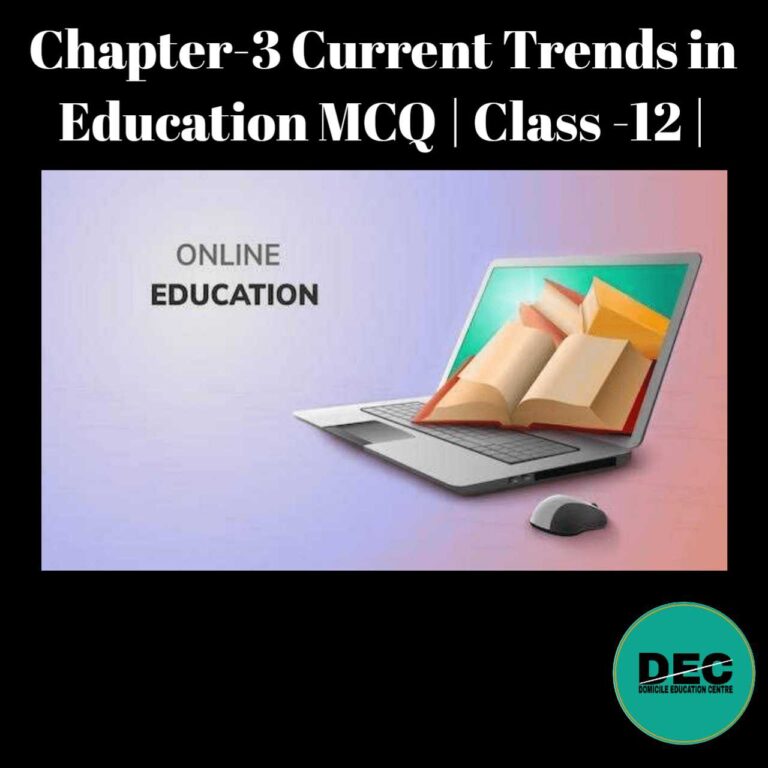
Chapter-3 Current Trends in Education MCQ | Class-12 |
Environmental Education MCQ
Here You will get Chapter-3 Current Trends in Education MCQ for Class-12 HS Final Examination 2027 as per New Education Policy 2020.
1. The term ‘environment’ is originated from _______ word:
A. Latin
B. Greek
C. French
D. German
Ans: Option C. French
2. The term ‘environment’ includes-
A. Living organism only
B. Only non-living things
C. Both living and non-living things
D. Air and water only
Ans: Option C. Both living and non-living things.
3. Which day is celebrated as ‘World Environment Day’?
A. April 22
B. March 22
C. June 5
D. July 11
Ans: Option C. June 5
4. Which of the following is NOT an example of Social environmental factor:
A. Population growth
B. Employment
C. Culture
D. Agriculture
Ans: Option D. Agriculture.
5. The first concept of environmental consciousness was introduced by:
A. Earnest Hackle
B. Earned Macke
C. Earnest John
D. Me Grow Hill
Ans: Option B. Earnest Macke
6. Earnest Macke introduced the first concept of environmental consciousness in:
A. 1879
B. 1869
C. 1889
D. 1899
Ans: Option B. 1969
7. Earnest Macke introduced the first concept of environmental consciousness from:
A. French
B. German
C. America
D. England
Ans: Option B. German
8. The most comprehensive definition of ‘environment’ came out in the whole of the intergovernmental conference of ‘environmental education’ in:
A. 1877
B. 1977
C. 1987
D. 1979
Ans: Option B. 1977
9. Environmental education is a part of which level of education in India?
A. Primary level
B. Secondary level
C. University level
D. All level of education
Ans: Option D. All level of education
10. What is the primary goal of environmental education?
A. Memorization of facts
B. To support economic development
C. Developing awareness and responsibility towards the environment
D. Promoting pollution.
Ans: Option C. Developing awareness and responsibility towards the environment.
11. Environmental education is important because it:
A. Discourages industrial growth
B. Teaches only about animals
C. Promotes sustainable development
D. Focuses only on theoretical knowledge.
Ans: Option C. Promotes sustainable development.
12. Environmental education is important in schools because:
A. It teaches agriculture
B. It helps students understand environmental issues
C. It replaces science subjects
D. It focusses on geography
Ans: Option B. It helps students understand environmental issues.
13. Which of these is a key component of environmental education?
A. Military training
B. Environmental awareness
C. Stock market knowledge
D. Political campaign
Ans: Option B. Environmental awareness
14. Which is not a component of environmental education?
A. Interdisciplinary approach
B. Promoting environmental awareness
C. Encouraging participation
D. Promoting consumerism
Ans: Option D. Promoting consumerism
15. Which of the following is the main aim of environmental education?
A. To control population growth
B. To spread environmental awareness
C. To create environmental laws
D. To promote industrialisation
Ans: Option B. To spread environmental awareness.
16. The Tbilisi conference was held in which year?
A. 1972
B. 1975
C. 1977
D. 1987
Ans: Option C. 1977
17. The Tbilisi conference took place in which country?
A. German
B. Russia
C. Georgia/USSR
D. Ukraine
Ans: Option C. Georgia/ USSR
18. The focus of the Tbilisi conference was on:
A. Population education
B. Environmental education
C. Global warming
D. Climate change
Ans: Option B. Environmental education
19. The Tbilisi declaration emphasized that environmental education should be:
A. Technology based only
B. Restricted to science subjects
C. Only theoretical
D. Life-long and interdisciplinary
Ans: Option D. Life-long and interdisciplinary.
20. How many guiding principles for environmental education were outlined in the Tbilisi declaration?
A. 3
B. 5
C. 7
D. 10
Ans: Option C. 7
21. The Tbilisi conference was organised by which organisation?
A. UNEP and UNESCO
B. WHO and UNICEF
C. UNDP and FAO
D. UNESCO and IUCN
Ans: Option A. UNEP and UNESCO
22. The Tbilisi declaration is important because it:
A. Established new schools in rural and urban areas.
B. Set global environmental laws
C. Provided a framework for environmental education globally
D. Banned all plastic use
Ans: Option C. Provided a framework for environmental education globally.
23. The Tbilisi declaration emphasised that environmental education should be:
A. A one-time awareness campaign
B. Only for environmentalists
C. Confined to natural science only
D. A life-long process and interdisciplinary.
Ans: Option D. A life-long process and interdisciplinary.
24. Environmental education was first emphasised in India in the year:
A. 1965
B. 1972
C. 2005
D. 1986
Ans’ Option D. 1986
25. Environmental education was made compulsory at all levels in India by supreme court decision in:
A. 1991
B. 2001
C. 2003
D. 2005
Ans: Option C. 2003
26. What does ‘3R’ in environmental education stand for?
A. Remove – Reuse – Reduce
B. Reform – Reuse – Repair
C. Rebuild – Reshape – Reuse
D. Reduce – Reuse – Recycle
Ans: Option D. Reduce – Reuse – Recycle
27. Who is known as the father of environmental education?
A. Rochel Carson
B. Charles Darwin
C. William James
D. Dr. William Stapp
Ans: Option D. Dr. William Stapp
Recent Posts
Calendar of Content List:
| M | T | W | T | F | S | S |
|---|---|---|---|---|---|---|
| 1 | ||||||
| 2 | 3 | 4 | 5 | 6 | 7 | 8 |
| 9 | 10 | 11 | 12 | 13 | 14 | 15 |
| 16 | 17 | 18 | 19 | 20 | 21 | 22 |
| 23 | 24 | 25 | 26 | 27 | 28 | |

Recent Comments